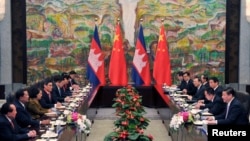Cambodia’s close relationship to China should be a concern for both the United States and for Asean neighbors, international experts say.
China is a major donor and investor in Cambodia, as it is for many poor countries in the region, expanding its influence in recent years.
But that relationship could become problematic for the US and Southeast Asian nations, according to experts who spoke recently at George Washington University.
The most prominent example of these troubles was Asean’s failure to reach a simple agreement over the South China Sea issue when Cambodia was the chair of Asean, experts say. For the first time in its history, Asean was not able to issue a joint communiqué following meetings in Phnom Penh, which some say was caused by Cambodia’s backing of Chinese interests.
“All China asks from Cambodia is support of core Chinese policy concerns,” said Pek Koong Heng, who heads the Asean Studies Center at American University. China wants a one-China policy, the exclusion of Taiwan from politics, a ban on hosting the Dalai Lama, a ban on the practitioners of Falun Gong and an eye kept on Uyghur Muslim minorities, she said.
China has provided Cambodia with up to $1 billion in aid, including military aid, and is its largest foreign direct investor, working in hydropower projects, mines and land concessions, she said. “Cambodia is a Chinese de facto proxy within Asean, and China is Cambodia’s top investor, top aid provider, top donor for large infrastructural projects, top trade partner.”
Murray Hiebert, chair of Southeast Asian studies at the Center for Strategic and International Studies, said Chinese investment, especially land concessions, is a major problem for Cambodia.
“There have been a lot of forced evictions sparking a lot of social unrest,” he said. “Thousands of people lost their lands to companies close to the [ruling] party, close to the military, close to Hun Sen, that are being used for plantations, sugar, rubber, doing some mining. So, there are a lot of confrontations between farmers who lost their lands and the government.”
Some US companies meanwhile don’t invest in Cambodia, he said, and the country faces ongoing macro-economic problems with rule of law, corruption, a weak transportation system, a lack of skilled labor and a weak education system.
The US’s diplomatic shift toward Asean has been troubled by Chinese pressure on Cambodia, especially in regards to human rights and democracy, observers said.
Marvin Ott, a visiting scholar for Southeast Asia studies at Johns Hopkins School of Advanced International Studies, said even the Khmer Rouge tribunal shows Chinese influence. Its scope was not broadened to include China’s role in the rise of the Khmer Rouge.
“China does not want the Khmer Rouge period given much recollection because China was deeply implicated and associated with the Khmer Rouge leadership,” he said. Prime Minster Hun Sen’s reputation was diminished internationally because of this, Ott said.




